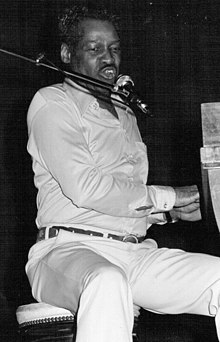Little Willie Littlefield
| Little Willie Littlefield | |
|---|---|

Littlefield performing at Saint-Ouen-l'Aumône, France, in 1980
|
|
| Background information | |
| Birth name | Willie Littlefield, Jr. |
| Born |
September 16, 1931 El Campo, Texas, U.S. |
| Died | June 23, 2013 (aged 81) Voorthuizen, Netherlands |
| Genres | |
| Occupation(s) |
|
| Instruments |
|
| Years active | 1949–2013 |
| Labels |
|
Willie Littlefield, Jr., billed as Little Willie Littlefield (September 16, 1931 – June 23, 2013), was an American R&B and boogie-woogie pianist and singer whose early recordings "formed a vital link between boogie-woogie and rock and roll". Littlefield was regarded as a teenage wonder and overnight sensation when in 1949, at the age of 18, he popularized the triplet piano style on his Modern Records debut single "It's Midnight". He also recorded the first version of the song "Kansas City" (originally issued as "K. C. Lovin'"), in 1952.
Littlefield was born in El Campo, Texas, and grew up in Houston with his mother. By 1947, at the age of sixteen, he was already a local attraction in many of the clubs on Dowling Street in Houston and was recording for Eddie Henry, a local record shop proprietor who ran his own label, Eddie's Records. He formed his first band with the saxophonist Don Wilkerson, a friend from school.
Littlefield was strongly influenced by the boogie-woogie pianist Albert Ammons. A particular favourite of his was Ammons's "Swanee River Boogie", which he later recorded for Eddie's Records. Other major influences on Littlefield's style were the Texas musicians Charles Brown and Amos Milburn Littlefield learned most of their "chops" and soon developed his own distinctive triplet style, which was widely copied by R&B musicians in the early 1950s, particularly Fats Domino, who incorporated it into his New Orleans rhythm and blues.
His first recording, "Little Willie’s Boogie", was a hit in Texas in 1949 and brought him to the attention of Jules Bihari, of Modern Records in Los Angeles, who was searching for a performer to rival the success of Amos Milburn. Bihari flew to Houston in July 1949 to investigate the city's black entertainment venues and heard of a "teenage wonder boy pianist" who was causing a stir at the Eldorado Ballroom. Bihari went to hear Littlefield and soon arranged for an audition at a local studio. The session was captured on acetate disc, with Bihari, clearly audible in the background, calling for Littlefield to play popular R&B tunes of the day.
...
Wikipedia
